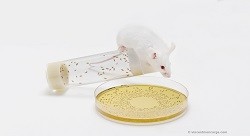Tapping microbe potential to tackle malnutrition
Fundamental lab work conducted by the MUTFLYGUTBACT project focused on a microbe that helps promote growth and digestive activity in both flies and mammals. The discoveries that have been made are highly relevant to the probiotic industry, which sells bacterial and yeast strains designed to promote health in humans and animals. The findings could also help address the pressing issue of global malnutrition, which affects some 150 million children worldwide. Understanding benefits of microbes The starting point of this project was an attempt to understand in a broad sense the influence of microorganisms on the physiology of animals. Do microbes shape the physiology of animals, and if so, how? While previous research has successfully established a link between intestinal microbes and digestive efficiency, characterising this impact on animal physiology has remained somewhat elusive. In order to address this, the MUTFLYGUTBACT project focused on a specific microbe in the gut of the common fruit fly. ‘We wanted to characterise the impact of Lactobacillus plantarum in flies and then characterise the mechanisms underlying this effect,’ explains project coordinator François Leulier from the Centre National de la Recherche Scientifique (CNRS) in the France. ‘This microbe is very efficient in promoting growth during post-natal development and in promoting digestive activity by allowing the animal to extract more nutrients from its diet.’ Interactions between Lactobacillus plantarum and digestive enzymes were analysed by reducing the amount of proteins given to the flies. Leulier and his team noticed that adding the bacteria effectively buffered the deleterious effect of undernutrition on fly development and post-natal growth. ‘The next step was to translate these results to a mammalian model,’ says Leulier. ‘We used germ-free mice to show that adding the microbes has the same positive buffer effect against malnutrition. We are currently working with conventional animal models (i.e not germ-free) and treating them daily with a strain of Lactobacillus plantarum. We are moving slowly but surely towards clinical trials in humans.’ Moving towards clinical trials This fundamental research into the effects of Lactobacillus plantarum could be highly significant for industry as well as organisations involved in the promotion of global health. ‘We are confident that this microbe has real clinical potential,’ says Leulier. ‘If we can provide clinical evidence that this strain helps to buffer the effects of malnutrition in infants this would be very significant.’ Leulier and his team are currently planning to apply for future grants and focus on the translational aspects of their findings. While much of this work is still at the pre-clinical stage, whilst patents related to some of the discoveries made through this project have already been submitted. A key sector likely to benefit from this continued research is the probiotics industry, which could use these findings to support health claims more robustly in the future. Leulier points out that many companies have collections of bacterial strains in freezers, and could benefit greatly if they were able to conclusively prove a real functional health benefit. ‘There is a big shift towards studying specific strains like Lactobacillus plantarum strains in order to more clearly establish clinical benefits,’ says Leulier. ‘We believe that our results will help to support some of the health claims that companies put forward. For me, one of the most satisfying things about this project has been starting from a fundamental question and then using a simple fly model to begin identifying bacterial strains that could be used to promote human health.’
Keywords
MUTFLYGUTBACT, microbes, microorganisms, probiotic, bacterial, Lactobacillus plantarum, CNRS

